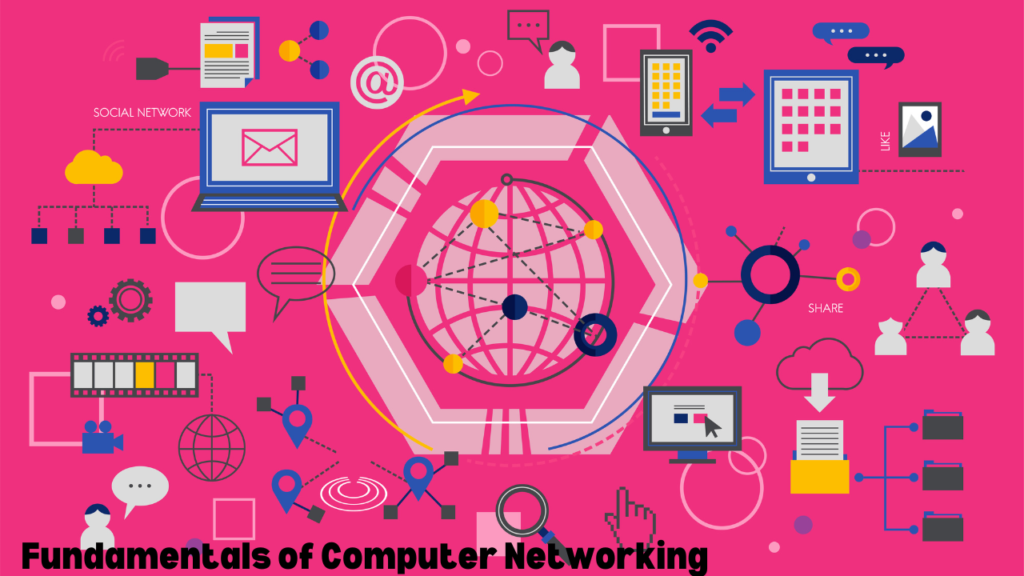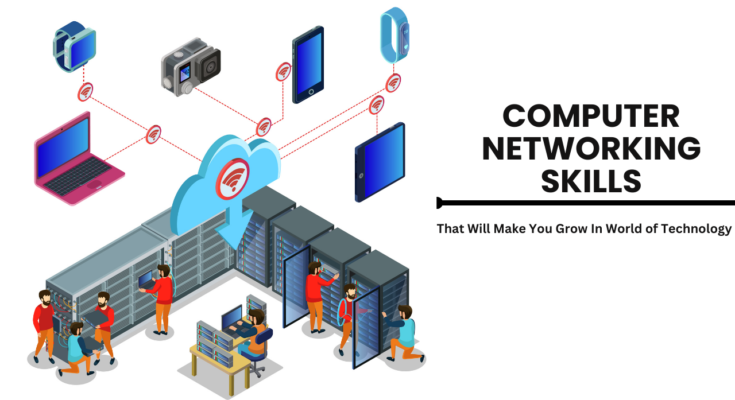Ultimate Computer Networking Skills That Will Make You Grow In World of Technology:
Fundamentals of Computer Networking
Computer networking encompasses the strategic interconnection of diverse devices with the goal of resource and information sharing.

This multifaceted field incorporates an array of technologies and methodologies designed to enable seamless communication among computers, servers, and other networked devices. At its core, computer networking involves the establishment of connections between disparate devices, allowing them to exchange data and access shared resources efficiently. Whether
Importance of Networking Skills
Networking skills hold significant importance in both personal and professional contexts, serving as valuable assets that contribute to personal growth, professional development, and overall success. These skills play a pivotal role in fostering meaningful connections, staying abreast of industry developments, and advancing career opportunities.
- In personal settings: networking skills enable individuals to cultivate and nurture relationships with others, both within and outside their immediate circles. By actively engaging with peers, mentors, and like-minded individuals, individuals can expand their social and professional networks, gaining access to diverse perspectives, experiences, and opportunities. Whether attending social events, participating in community activities, or leveraging online platforms, effective networking facilitates the exchange of ideas, support, and resources, enriching personal connections and enhancing overall well-being.
- In professional settings: networking skills are essential for building and maintaining professional relationships, advancing career goals, and accessing valuable career opportunities. Networking enables individuals to connect with colleagues, industry professionals, and potential employers, allowing them to exchange information, seek advice, and explore potential collaborations. By actively participating in industry events, conferences, and networking forums, professionals can stay updated on industry trends, best practices, and emerging opportunities, positioning themselves as knowledgeable and influential contributors within their respective fields.
25 Essential Computer Networking Skills:
-
TCP/IP Fundamentals:
Understanding the basics of the Transmission Control Protocol/Internet Protocol (TCP/IP) suite.
-
Routing Protocols:
Familiarity with routing protocols such as OSPF, BGP, and EIGRP for efficient data routing.
-
Switching Concepts:
Understanding switching concepts like VLANs, STP, and port security for network segmentation and traffic management.

Ultimate Computer Networking Skills That Will Make You Grow - Firewall Configuration:Configuring and managing firewalls to control inbound and outbound network traffic.
- Intrusion Detection and Prevention Systems (IDPS):Implementing IDPS solutions to detect and prevent malicious activities on the network.
- Wireless Security:
Securing wireless networks through encryption, authentication, and access control measures.
- Network Performance Optimization:Optimizing network performance by analyzing and fine-tuning network configurations and protocols.
- Cloud Networking:Understanding networking principles in cloud environments and configuring cloud-based networking services.
- Virtual Private Networks (VPNs):Setting up and managing VPN connections for secure remote access to the network.
- Network Monitoring Tools:Proficiency in using network monitoring tools such as Wireshark, Nagios, or SolarWinds for real-time monitoring and analysis.
- Load Balancing Technologies:Configuring and managing load balancers to distribute network traffic across multiple servers.
- Quality of Service (QoS):Implementing QoS policies to prioritize network traffic based on specific criteria such as latency or bandwidth requirements.
- Network Troubleshooting Techniques:Mastering troubleshooting methodologies and tools to identify and resolve network issues efficiently.
- Network Design Principles:Designing scalable and resilient network architectures that meet business requirements and growth objectives.
- Software-Defined Networking (SDN):Understanding SDN concepts and technologies for centralized network management and automation.
- Network Security Best Practices:Adhering to security best practices such as least privilege, principle of least privilege, and defense in depth to protect network assets.
- IPv6 Migration:Planning and implementing IPv6 migration strategies to accommodate the growing number of connected devices.
- Network Access Control (NAC):
Implementing NAC solutions to enforce security policies and control access to network resources. - Disaster Recovery Planning:
Developing disaster recovery plans and procedures to minimize downtime and data loss in the event of a network failure or disaster. - Network Automation Tools:
Using automation tools like Ansible, Puppet, or Chef to streamline network configuration and management tasks. - Network Documentation Practices:
Maintaining comprehensive documentation of network configurations, topology, and changes for reference and troubleshooting purposes. - Ethical Hacking Skills:
Understanding ethical hacking techniques to identify and mitigate network vulnerabilities before they can be exploited by malicious actors. - Collaboration and Communication:
Effective communication and collaboration with cross-functional teams to implement network solutions and address business needs. - Continuous Learning:
Staying updated with the latest networking trends, technologies, and certifications to enhance skills and stay competitive in the field. - Business Acumen:
Understanding the business objectives and requirements to align network solutions with organizational goals and priorities.
Adaptability
How to Improve Computer Networking Skills
Continuous Learning:
Embrace the ethos of perpetual learning by actively pursuing educational opportunities such as courses, tutorials, and certifications to remain abreast of the latest advancements within the industry. This commitment to ongoing education ensures that one remains current with evolving technologies, methodologies, and best practices, thereby fortifying their foundation of knowledge and expertise in the field of networking.
Hands-On Practice:

Acquire practical experience through hands-on engagement with configuring and troubleshooting network systems. This experiential learning approach is indispensable for honing and mastering networking skills, as it provides invaluable insights into real-world challenges and scenarios. By immersing oneself in practical exercises and projects, individuals can deepen their understanding of networking concepts and develop the proficiency needed to tackle complex issues with confidence and proficiency.
Networking Events and Workshops:
Participate in networking events and workshops within the industry to forge connections with fellow professionals, glean insights into emerging technologies, and broaden one’s professional network. These events offer fertile ground for fostering meaningful relationships, sharing knowledge, and staying attuned to industry trends and developments. By actively engaging in networking opportunities, individuals can expand their circle of influence, cultivate valuable partnerships, and position themselves for career advancement and growth.
Seeking Feedback:
Proactively seek feedback from peers and mentors to solicit constructive criticism, identify areas for improvement, and refine one’s networking abilities. Constructive feedback serves as a catalyst for growth, offering valuable perspectives and insights that can propel individuals towards greater proficiency and effectiveness in networking. By remaining open to feedback and receptive to suggestions, individuals can continuously iterate and enhance their networking skills, ultimately strengthening their professional capabilities and positioning themselves for success in the dynamic landscape of networking.
Conclusion
Computer networking skills are essential for success in the technology-driven world. By focusing on communication, problem-solving, technical proficiency, collaboration, and adaptability, individuals can enhance their networking skills and thrive in various roles within the IT industry.
Unique FAQs
Why are communication skills important in computer networking?
Effective communication fosters collaboration and ensures smooth information exchange within network teams.
How can I improve my technical skills in networking?
Continuous learning and hands-on practice are effective ways to enhance technical proficiency in networking.
What role does adaptability play in networking careers?
Adaptability enables professionals to stay updated on industry changes and embrace new technologies, ensuring continued success in networking careers.
Are networking events beneficial for enhancing networking skills?
Yes, networking events provide opportunities to connect with industry professionals, learn about new technologies, and expand professional networks, contributing to the development of networking skills.
How can I effectively solicit feedback to improve my networking skills?
Seeking feedback from peers and mentors and being open to constructive criticism are essential for identifying areas for improvement and enhancing networking skills.



